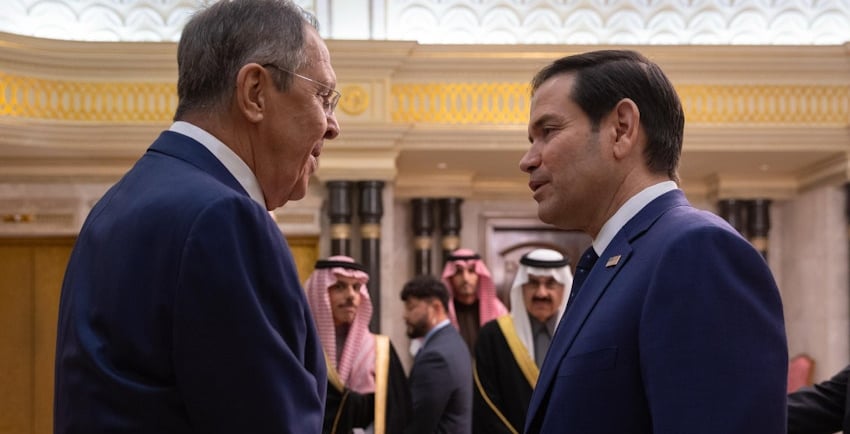Saudi Arabia: Fragile Diplomacy Underway as US and Russia Seek Peace in Ukraine
High-level talks between the United States and Russia are underway in Saudi Arabia, aiming to reset relations and seek an end to the conflict in Ukraine. Can diplomacy succeed where years of hostility and failed negotiations have fallen short?
RUSSIAUNITED STATES
Aisulu Sarmanova
2/20/20253 min read


High-ranking officials from the United States and Russia convened in Saudi Arabia to initiate dialogues aimed at mending bilateral ties and brokering a settlement to the ongoing conflict in Ukraine. The Diriyah Palace in Riyadh served as the venue for a pivotal meeting between delegations led by U.S. Secretary of State Marco Rubio and Russian Foreign Minister Sergey Lavrov. This diplomatic engagement marked a significant step in President Donald Trump’s efforts to overturn three years of U.S. policy geared towards isolating Russia following its military intervention in Ukraine. The ultimate aim appears to be paving the way for a direct meeting between Trump and Russian President Vladimir Putin.
Although an official presidential summit has not yet occurred, Trump and Putin had already agreed to continue working towards an end to the conflict following a telephone call on 12 February. This conversation, the first between the two leaders since Trump's inauguration the previous month, lasted nearly 90 minutes, according to the Kremlin. It also revealed Trump’s growing determination to accelerate the resolution of the Ukraine crisis, as contours of a potential settlement plan begin to take shape amid renewed contact between Washington and Moscow.
While travelling across Europe this week, senior U.S. officials have begun articulating the administration’s evolving stance on the crisis. Defence Secretary Pete Hegseth, speaking at a conference in Brussels, stated that the United States would no longer prioritise the security of Europe and Ukraine, as the Trump administration shifts its focus towards fortifying U.S. borders and avoiding conflict with China. Hegseth further suggested that the notion of Ukraine joining NATO was an unrealistic expectation, a stance that is likely to dismay Kyiv and its European allies.
On 18 February, President Trump publicly expressed his willingness to meet Putin before the end of the month, while downplaying Ukraine’s concerns about being excluded from the U.S.-Russia negotiations in Riyadh. Secretary Rubio, addressing the media after the talks, confirmed that while both sides had agreed to pursue further dialogue, no date had been set for a Trump-Putin summit specifically focused on Ukraine.
The conflict itself traces back to 24 February 2022, when Putin ordered Russian troops into Ukraine, citing Kyiv’s NATO ambitions as a "red line" for Moscow. He characterised NATO's eastward expansion as a direct threat to Russia's security and demanded guarantees that Ukraine would not be admitted into the alliance. The Kremlin anticipated a swift victory, but Ukrainian resistance, bolstered by substantial Western military aid, quickly shattered those expectations. The resulting conflict has led to significant casualties on both sides, marking the most intense military confrontation in Europe since the Second World War.
Trump described his recent dialogue with Putin as "exceptionally fruitful," praising the Russian leader’s "time and effort" while conspicuously avoiding any acknowledgment of Russia’s culpability for initiating the conflict. He confirmed having spoken with Ukrainian President Volodymyr Zelenskyy following his conversation with Putin but refrained from guaranteeing Ukraine’s inclusion as an equal partner in future peace talks. This omission has heightened concerns in Kyiv that a settlement might be reached without its direct involvement, potentially undermining Ukrainian sovereignty and territorial integrity.
Beyond the political ramifications, the evolving diplomatic landscape presents potential economic opportunities. Should tensions ease, businesses could find new avenues for investment, particularly if sanctions are relaxed and cross-border cooperation expands. Energy, infrastructure, and technology sectors stand to benefit as diplomatic efforts gain momentum. In particular, companies involved in pipeline construction and maintenance might find fresh opportunities in both Russia and Europe as geopolitical constraints diminish.
Moreover, Hegseth’s assertion that U.S. priorities are shifting away from European security could create openings for private-sector involvement in defence and cybersecurity across the continent. European nations, reassessing their security frameworks, may increasingly turn to domestic and private-sector providers to fill the void left by waning American commitment. This shift could drive demand for military technology, logistics, and cyber defence solutions.
Meanwhile, the potential for a negotiated peace in Ukraine also raises the prospect of extensive reconstruction efforts. Any comprehensive settlement would necessitate substantial investment in rebuilding Ukraine’s infrastructure, creating opportunities for international firms specialising in large-scale development projects. Financial institutions and international organisations would likely play a significant role in funding post-conflict recovery, further broadening avenues for corporate participation.
While the political landscape remains fluid, the intersection of diplomatic initiatives and shifting geopolitical priorities suggests an environment ripe for strategic corporate engagement. Businesses that remain vigilant and adaptable may find themselves well-positioned to capitalise on emerging opportunities in an evolving global order.


